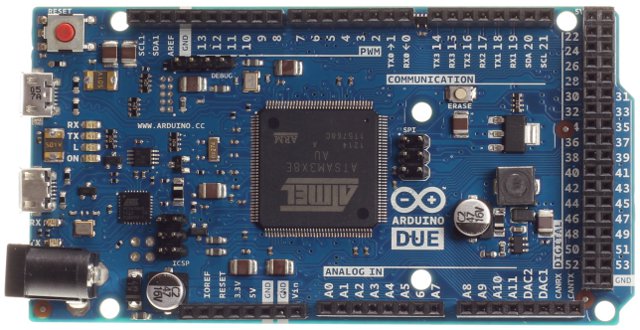Announced a little over a year ago, the Arduino (over) Due based on Atmel SAM3U Cortex M3 MCU is finally available for purchase.
The specifications of the new boards are as follows:
- Microcontroller – Atmel AT91SAM3X8E @ 84 Mhz
- Flash Memory – 512 KB
- SRAM – 96 KB (64 + 32 KB)
- Operating Voltage – 3.3V
- Input Voltage (recommended) – 7-12V
- Input Voltage (min/max) – 6-20V
- Digital I/O Pins – 54 including 6 supporting PWM
- Analog Input Pins – 12
- Analog Output Pins – 2 (DAC)
- Total DC Output Current on all I/O lines – 130 mA
- DC Current for 3.3V Pin – 800 mA
- DC Current for 5V Pin – Theoretical 1A, recommended 800 mA
- Debug ports – JTAG/SWD connector
The new board is mostly compatible with the AVR (8-bit) boards, but since the board runs at 3.3V some shields may not be compatible (Arduino Wi-Fi and Ethernet shields do work) and some low level code for the AVR boards won’t work on the ARM board, and the code will require some modifications.
The board comes with a new IDE (v1.5) that can compile both for AVR and ARM that will eventually replace IDE v1.0.1 after further testing.
Arduino co-founder Massimo Banzi told wired that beginners and less advanced user should probably stick with Arduino Uno or Leonardo because of their simplicity, stability and the amount of examples and libraries. Arduino Due should be used by people requiring more power, notably better ADC performance (Due: 1,000 ksps (kilosamples per second) vs Uno, Leonardo, and Mega 2560: 15 ksps.) for projects such as Chris Anderson’s Quadcopters.
Arduino Due costs 39 Euros (exc. VAT) and is available since Monday, October 22nd on Arduino eStore and distributors. Further details are available on Arduino Due page.
Via: Wired

Jean-Luc started CNX Software in 2010 as a part-time endeavor, before quitting his job as a software engineering manager, and starting to write daily news, and reviews full time later in 2011.
Support CNX Software! Donate via cryptocurrencies, become a Patron on Patreon, or purchase goods on Amazon or Aliexpress





